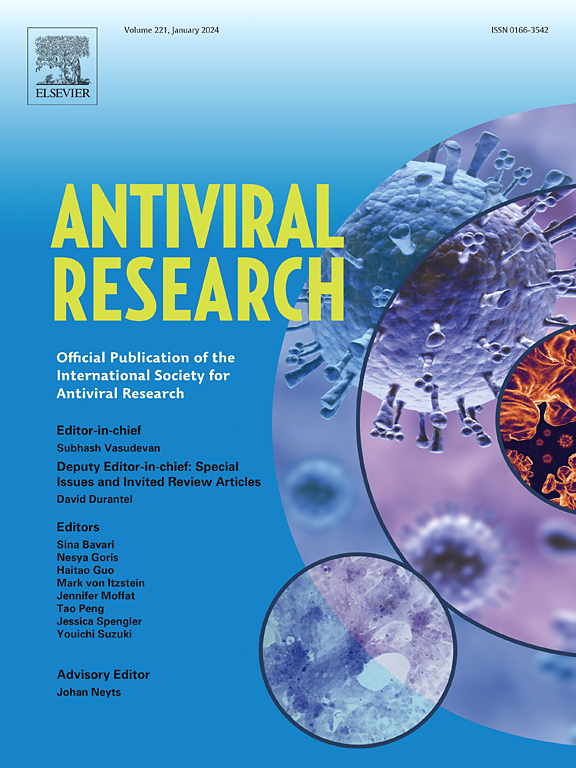Crimean-Congo hemorrhagic fever virus replicon particle vaccine is safe and elicits functional, non-neutralizing anti-nucleoprotein antibodies and T cell activation in rhesus macaques
IF 4.5
2区 医学
Q1 PHARMACOLOGY & PHARMACY
引用次数: 0
Abstract
Advancement of vaccine candidates that demonstrate protective efficacy in screening studies necessitates detailed safety and immunogenicity investigations in pre-clinical models. A non-spreading Crimean-Congo hemorrhagic fever virus (CCHFV) viral replicon particle (VRP) vaccine was developed for single-dose administration to protect against disease. To date, several studies have supported safety, immunogenicity, and efficacy of the CCHF VRP in multiple highly sensitive murine models of lethal disease, but the VRP had yet to be evaluated in large animals. Here, we performed studies in non-human primates to further evaluate clinical utility of the VRP vaccine. Twelve adult male and female rhesus macaques were vaccinated intramuscularly and clinical monitoring was performed daily for 28 days. At 3, 7, 14, 21, and 28 days post vaccination, animals were sedated for more detailed clinical assessment; for quantification of vaccine presence in blood and mucosal samples; and for evaluation of hematology, plasma inflammatory markers, and immunogenicity. Consistent with findings in mice, vaccination was well tolerated, with no clinical alterations nor indication of vaccine spread or shedding. In addition, vaccination induced both humoral and cell-mediated responses, with immune profile and kinetics also corroborating data from small animal models. These studies provide key data in non-human primates further supporting development of the VRP for human clinical use.
克里米亚-刚果出血热病毒复制子颗粒疫苗是安全的,并在恒河猴中引起功能性、非中和性抗核蛋白抗体和T细胞活化。
在筛选研究中显示出保护功效的候选疫苗的进展需要在临床前模型中进行详细的安全性和免疫原性研究。研制了一种非传播性克里米亚-刚果出血热病毒复制子颗粒(VRP)疫苗,用于单剂量给药以预防疾病。迄今为止,已有几项研究支持CCHF VRP在多种高度敏感的致死性疾病小鼠模型中的安全性、免疫原性和有效性,但VRP尚未在大型动物中进行评估。在这里,我们在非人类灵长类动物中进行了研究,以进一步评估VRP疫苗的临床应用。对12只成年雄性和雌性恒河猴进行肌肉注射疫苗接种,并每天进行临床监测。在接种疫苗后3、7、14、21和28天,对动物进行镇静,以进行更详细的临床评估;用于定量血液和粘膜样品中疫苗的存在;用于血液学、血浆炎症标志物和免疫力的评估。与小鼠研究结果一致,疫苗接种耐受性良好,没有临床改变,也没有疫苗传播或脱落的迹象。此外,疫苗接种诱导了体液和细胞介导的反应,免疫谱和动力学也证实了小动物模型的数据。这些研究提供了非人类灵长类动物的关键数据,进一步支持VRP用于人类临床应用的开发。
本文章由计算机程序翻译,如有差异,请以英文原文为准。
求助全文
约1分钟内获得全文
求助全文
来源期刊

Antiviral research
医学-病毒学
CiteScore
17.10
自引率
3.90%
发文量
157
审稿时长
34 days
期刊介绍:
Antiviral Research is a journal that focuses on various aspects of controlling viral infections in both humans and animals. It is a platform for publishing research reports, short communications, review articles, and commentaries. The journal covers a wide range of topics including antiviral drugs, antibodies, and host-response modifiers. These topics encompass their synthesis, in vitro and in vivo testing, as well as mechanisms of action. Additionally, the journal also publishes studies on the development of new or improved vaccines against viral infections in humans. It delves into assessing the safety of drugs and vaccines, tracking the evolution of drug or vaccine-resistant viruses, and developing effective countermeasures. Another area of interest includes the identification and validation of new drug targets. The journal further explores laboratory animal models of viral diseases, investigates the pathogenesis of viral diseases, and examines the mechanisms by which viruses avoid host immune responses.
 求助内容:
求助内容: 应助结果提醒方式:
应助结果提醒方式:


